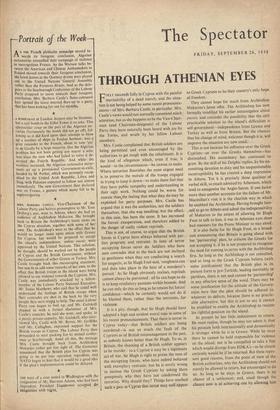--Portrait c the Week , A s THE French plebiscite campaign moved
to-
wards its foregone conclusion, Algerian nationaliits intensified their campaign of violence in metropolitan France. As the Warsaw talks be- tween the American and Chinese Ambassadors to Poland moved towards their foregone conclusion, the latest scenes in the Quemoy drama were played out in the United Nations ' General Assembly rather than the Formosa Straits. And as the dele- gates to the Scarborough Conference of the Labour Party prepared to move towards their foregone conclusion, Mrs. Barbara Castle's flame-coloured hair ignited the latest internal flare-up in a party that has been looking for one for months.
A BOMB-HOAX at London Airport may be tiresome; but a real bomb in the Eiffel Tower is no joke. This spectacular coup on the part of the Algerian ter- rorists (fortunately the bomb did not go off), fol- lowing as it did hard upon their attempt to blow up a number of ships in Toulon harbour, was ,a grim reminder to the French, about to vote 'yes' to de Gaulle by a large majority, that the Algerian problem has not been getting any nearer a solu- tion since the men who had failed to solve it de- stroyed the Fourth Republic. And while the violence increased, the Algerian nationalist move-, ment set up .a provisional Government-in-exile. headed by M. Ferhat, which was promptly recog- nised by the United Arab Republic, Libya and . Iraq, with Pakistan expected to follow suit almost immediately. The new Government then declared war on France, a gesture which many felt to be supererogatory.
*
MRS. BARBARA CASTLE, Vice-Chairman of the Labour Party and heiress presumptive to Mr. Tom Driberg's seat, went to Athens, where she had an ' audience of Archbishop Makarios. She brought back to Britain the Archbishop's latest views on the Cyprus situation, together with some of her own. The Archbishop's were to the effect that he would no longer insist upon union with Greece for Cyprus, but would be prepared to accept the island's independence, unless enosis were approved by the United Nations. This solution, he thought, should be worked out by the people of Cyprus and the British Government, without the Governments of either Greece or Turkey. Mrs. Castle brought back this encouraging statement, but saw fit to add some remarks of her own. to the effect that British troops in the island were being allowed to use violence towards the Cypriots. Mrs, Castle was immediately attacked by a fellow- member of the Labour Party National Executive, Mr. James Matthews, who said that he could well understand the feelings of British troops when their comrades are shot in the back by the very people they were trying to help. The usual Labour Party row began to boil up, and Mr. Gaitskell stepped in with a formal disclaimer of Mrs. Castle's remarks; he said she went, and spoke, in a purely private capacity. Mr. Gaitskell, who inter- viewed Mrs. Castle with Mr. Bevan, Mr. Griffiths and Mr. Callaghan, expressed support for the British troops in Cyprus. The Labour Party then proceeded to start packing fow its annual confer- ence at Scarborough. Amid all this, the message Mrs. Castle brought back from Archbishop Makarios rather got lost sight of. The Governor announced that the British plan for Cyprus was going to he put into operation regardless, and NATO began to hint that it would be a good idea if the plan's implementation could be delayed.
* THE TALE of a coat ended in Washington with the resignation of Mr, Sherman Adams, who had been imprudent. President Eisenhower accepted he resignation with regret.


































 Previous page
Previous page